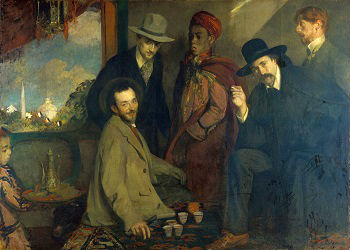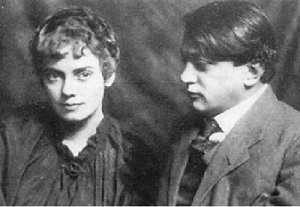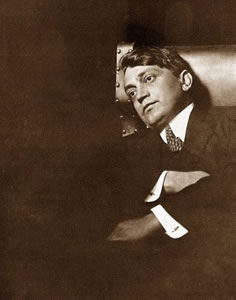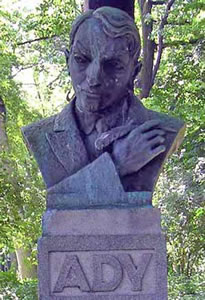De Franse schrijver André Gide werd geboren op 22 november 1869 in Parijs. Zie ook alle tags voor André Gide op dit blog.
Uit: La Porte étroite
“J’ai revu Juliette l’an passé. Plus de dix ans s’étaient écoulés depuis sa dernière lettre, celle qui m’annonçait la mort d’Alissa. Un voyage en Provence me fut une occasion de m’arrêter à Nîmes. Avenue de Feuchères, au centre bruyant de la ville, les Teissières habitent une maison d’assez belle apparence. Bien que j’eusse écrit pour annoncer ma venue, j’étais passablement ému en franchissant le seuil.
Une bonne me fit monter dans le salon où, quelques instants après, Juliette vint me rejoindre. Je crus voir la tante Plantier : même démarche, même carrure, même cordialité essoufflée. Elle me pressa tout aussitôt de questions dont elle n’attendait pas les réponses, sur ma carrière, mon installation à paris, mes occupations, mes relations ; qu’est-ce que je venais faire dans le Midi ? Pourquoi n’irais-je pas jusqu’à Aigues-Vives où Edouard serait si heureux de me voir ?… Puis elle me donnait des nouvelles de tous, parlait de son mari, de ses enfants, de son frère, de la dernière récolte, de la mévente… J’apprenais que Robert avait vendu Fongueusemare, pour venir habiter Aigues-Vives ; qu’il était maintenant l’associé d’Edouard, ce qui permettait à celui-ci de voyager et de s’occuper plus spécialement de la partie commerciale de l’affaire, tandis que Robert restait sur les terres, améliorant et étendant les plants.
Cependant je cherchais des yeux, inquiètement, ce qui pouvait rappeler le passé. Je reconnaissais bien, parmi le mobilier neuf du salon, quelques meubles de Fongueusemare ; mais ce passé qui frémissait en moi, il semblait que Juliette à présent l’ignorât ou prît à tache de nous en distraire.
Deux garçons de douze et treize ans jouaient dans l’escalier ; elle les appela pour me les présenter. Lise, l’aînée de ses enfants, avait accompagné son père à Aigues-Vives. Un autre garçon de dix ans allait rentrer de promenade ; c’est celui dont Juliette m’avait annoncé la naissance prochaine en m’annonçant aussi notre deuil. Cette dernière grossesse ne s’était pas terminée sans peine ; Juliette en était restée longtemps éprouvée ; puis, l’an passé, comme se ravisant, elle avait donné le jour à une petite fille qu’il semblait, à l’entendre parler, qu’elle préférât à ses autres enfants.
« Ma chambre, où elle dort, est à côté, dit-elle ; viens la voir. » Et comme je la suivais : « Jérôme je n’ai pas osé te l’écrire… consentirais-tu à être parrain de cette petit ?
– Mais j’accepte volontiers, si cela doit t’être agréable, dis-je, un peu surpris, en me penchant vers le berceau. “
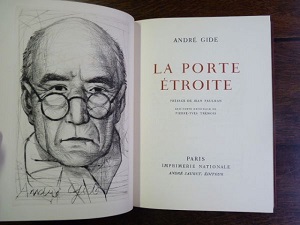
André Gide (22 november 1869 – 19 februari 1951)
Geïllustreerde editie van het boek
De Engelse dichteres en schrijfster George Eliot werd geboren op 22 november 1819 in Nuneaton in Warwickshire. Zie ook alle tags voor George Eliot op dit blog.
Uit: Adam Bede
“I was dreadful frightened, and angry with her for going. I didn’t go to give information, because I’d no thought she meant to do any harm, and I knew she had money in her pocket to buy her food and lodging. I didn’t like to set the constable after her, for she’d a right to go from me if she liked.”
The effect of this evidence on Adam was electrical; it gave him new force. Hetty could not be guilty of the crime — her heart must have clung to her baby — else why should she have taken it with her? She might have left it behind. The little creature had died naturally, and then she had hidden it. Babies were so liable to death — and there might be the strongest suspicions without any proof of guilt. His mind was so occupied with imaginary arguments against such suspicions, that he could not listen to the cross-examination by Hetty’s counsel, who tried, without result, to elicit evidence that the prisoner had shown some movements of maternal affection towards the child. The whole time this witness was being examined, Hetty had stood as motionless as before: no word seemed to arrest her ear. But the sound of the next witness’s voice touched a chord that was still sensitive, she gave a start and a frightened look towards him, but immediately turned away her head and looked down at her hands as before. This witness was a man, a rough peasant. He said:
“My name is John Olding. I am a labourer, and live at Tedd’s Hole, two miles out of Stoniton. A week last Monday, towards one o’clock in the afternoon, I was going towards Hetton Coppice, and about a quarter of a mile from the coppice I saw the prisoner, in a red cloak, sitting under a bit of a haystack not far off the stile. She got up when she saw me, and seemed as if she’d be walking on the other way. It was a regular road through the fields, and nothing very uncommon to see a young woman there, but I took notice of her because she looked white and scared. I should have thought she was a beggar-woman, only for her good clothes.”
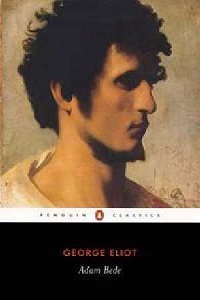
George Eliot (22 november 1819 – 22 december 1880)
Cover
De Nederlandse schrijver Dirk van Weelden werd geboren in Zeist op 22 november 1957. Zie ook alle tags voor Dirk van Weelden op dit blog.
Uit: Training
“De handrem kraakte. De stilte van het bos overspoelde de auto. We stapten uit. De grond rook naar potaarde uit de supermarkt.
‘Iets te drinken meenemen?’ vroeg ik.
‘Heb ik aan gedacht,’ zei Denijs. Hij toonde de inhoud van zijn lichtgewicht rugzakje: druivesuiker, twee bananen en een plastic veldflesje met isotone frisdrank.
Voor de warming up wandelden we naar een open plek waar banken stonden die het stretchen makkelijker maakten. De heldere winterlucht smaakte lekker en ik haalde zo diep mogelijk adem.
Tijdens de warming up zei Denijs:
‘Kijk, daarom belde ik je. We hebben allebei de juiste loopconditie om dit experiment te kunnen doen, als het lopen een probleem is heeft het sowieso geen zin. Je moet aandacht óver hebben.’
Hij had onderweg in de auto verteld van het experiment dat op stapel stond. Het trainen van ons geestesoog. Denijs had een theorie over het afsterven van de visuele verbeeldingskracht. Dat kwam door de overdaad aan kant en klare beelden waarmee een modern mens overspoeld werd. Voorzover de moderne mens zich met gesloten ogen beelden voor de geest kon halen was het een vuilstort van versleten plaatjes. De oosterse meditatie, gericht op het leegmaken van de gedachten wees hij af.
‘Laten we nuchter zijn,’ zei hij, ‘dat veronderstelt toch een soort volkenkundige salto mortale, zo zit ons denken niet in elkaar. Zelfs de mystiekste monniken hebben altijd over Maria, Jezus, een heilige of een bijbeltekst gemediteerd. Niks leegte. Een helder beeld, dat ze zich steeds beter leerden voorstellen. Ze trainden hun geestesoog. Tot ze konden denken in beelden. Geen opgejaagde stroom van ooit vluchtig opgepikte televisiebeelden en foto’s, maar zelf samengestelde en opgeroepen beelden.
‘Die mentale cinema is in onbruik geraakt. Ons geestesoog is lui geworden en luie ogen worden blind. Mensen hebben er tegenwoordig moeite mee iets te lezen en het voor zich te zien. En als ze zich iets voorstellen om het te beschrijven schieten hun alleen vlakke, grauwe beelden te binnen. Ik wil mijn geestesoog trainen om het krachtiger te maken en er een betere controle over te hebben.”
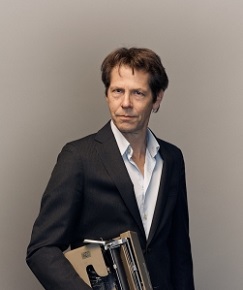
Dirk van Weelden (Zeist, 22 november 1957)
De Duitse dichter, schrijver, acteur en regisseur Christian Filips werd geboren op 22 november 1981 in Osthofen. Zie ook alle tags voor Christian Filips op dit blog.
Als ich neulich nachts
an die Wand gedrückt, wieder
(Ich-Taste) wie damals, mit sechs
oder sieben, die Eltern (im Traum
sind im Krieg)
kalt weiß massiv
(im Scheidungskrieg) geblieben
der Eindruck, den die Wand
ihm – wem? –
wieder gut macht:
Zugewandter
wendet die Wand sich
zu.
Ich sitze da, wo du mich sitzen lässt
auf deines Vaters Mauer, hoch dort oben
(Landschaft mit Kranich, Schilf
und Brise, weiter hinten)
höre ich dich
an dir vorbei …
und höre
einen Flussgott, jung
der an die hohe, hehre
strullt (Mauer in der
Abenddämmerung)
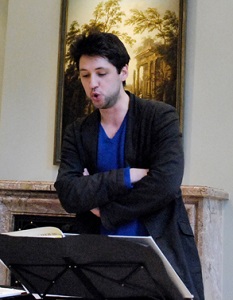
Christian Filips (Osthofen, 22 november 1981)
De Brits-Indische schrijverstweeling Suresh en Jyoti Guptara werd geboren op 22 november 1988 in Frimley, Hants in het zuidoosten van Engeland. Zie ook alle tags voor Suresh en Jyoti Guptara op dit blog.
Uit: Calaspia, Das Erbe der Apheristen (Vertaald door Frank Böhmert)
„Es roch nach Räucherwerk. Er blickte sich suchend um, bis er die Weihrauchkugeln fand, die in einer Schale brannten. Schnuppernd ging er immer näher heran. Als ihn der Rauch in die Nase biss, schüttelte er mit einem Niesen den Kopf und tastete mit zittrigen Fingern nach der Glut. Er riss die Hand zurück. «Hast du den Verstand verloren, du Narr?» Plötzlich schien ihn der Anblick seines Gemachs zu ängstigen. Er sah sich vergeblich nach einer Wache um. Er hatte längst vergessen, dass sie allesamt draußen postiert waren, und wagte es nicht, die Tür zu öffnen, weil davor unaussprechliche Wesen auf der Lauer liegen mochten. «Peasmi? Rameon? Warum habt ihr mich verlassen?» Klagend und hustend schlich er umher. «Vater? Ich dachte, du wärst tot … Elyon sei Dank, dann bin ich gar nicht Imperator! Ich hatte einen Albtraum … viele Albträume …» Seine wirren Reden endeten in einem Aufschrei: «Holt mich hier heraus!» Er stolperte zu seinem Thron und strich mit den Finger spitzen über die Schatulle auf der Armlehne. Es bereitete ihm einige Mühe, den Deckel zu öffnen. Bald seufzte er erleichtert, versank in immer tieferen Schichten der Bewusstlosigkeit. Außerhalb der Gefangenschaft seiner Gedanken, außerhalb seines Palasts, der ihm wie ein Kerker vorkam, brannte sein Imperium.
***
Hundert Wegstunden von der schwimmenden Hauptstadt des Imperiums entfernt, stapfte ein bebrillter Krieger mit freiem Oberkörper durch den Schnee der Säbelzahnberge. Die behaarten Arme des Zwergs besaßen denselben Umfang wie die Oberschenkel der Soldaten, die er mit einem finsteren Blick bedacht hatte, als sie über diese Kombination von Körperkraft und Sehschwäche zu lachen wagten. Inzwischen befand sich Galar Sturlison im sturmumtosten Grenzland. Er kniff die tränenden Augen zusammen und hielt nach anderen Lebensformen Ausschau. Die Heere der Numenii standen versammelt im Hinterland und warteten auf den Befehl, in das unabhängige Königreich des Nordens einzufallen, und er sollte erkunden, inwieweit Polgaren seine Truppen bereits zusammengezogen hatte. Außer ein paar Bauern, die in der rauen Umgebung ein undankbares Dasein fristeten, lebte im Umkreis von Meilen niemand. Die windgepeitschten Gipfel ließen sich kaum voneinander unterscheiden, die Sonne gleißte schmerzhaft auf den Schneefeldern und Gletschern. Da nahm er ja sogar lieber am Rat von COLA teil, von Calaspias Offiziellen und Landesältesten, die durch ein schmutziges Komplott dazu verleitet worden waren, das Land in diesen Schlamassel zu stürzen. Politik hin oder her, dort gab es wenigstens etwas Anständiges zu futtern.“
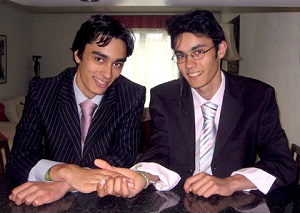
Suresh en Jyoti Guptara (Frimley, 22 november 1988)
De Russische schrijver Viktor Pelevin werd geboren op 22 november 1962 in Moskou. Zie ook alle tags voor Viktor Pelevin op dit blog.
Uit: Buddha’s Little Finger (Vertaald door Andrew Bromfield)
“Vorblei picked up the receiver. `Yes, comrade Babayasin,’ he roared into the ebony cup of the mouthpiece. `Yes, I remember … No, don’t send them … Comrade Babayasin, I can’t do that, it will look ridiculous … Just imagine — with the sailors, it will be a disgrace … What? I will follow orders, but I must register a vigorous protest … What?’
He glanced sideways at me and, not wishing to embarrass him, I went through into the lounge.
The floor there was covered with newspapers — most of them banned long ago. I supposed there must have been files of them left behind in the flat. Other traces of the place’s former life were also visible: there was a delightful Turkish carpet hanging on the wall and below it stood a secretaire decorated with enamel rhomboids of various colours. As soon as I saw it I realized that a well-to-do bourgeois family must have lived there. A large mirror stood against the opposite wall. Beside it hung a crucifix in the art-nouveau style, and for a moment I pondered the nature of the religious feeling which might correspond to such a work of art. A considerable part of the space was occupied by an immense bed under a yellow canopy. The items that stood on the round table in the centre of the room seemed to me — possibly because of their proximity to the crucifix — to be a still-life composed of esoteric Christian motifs: a large bottle of vodka, a halvah tin shaped like a heart, a staircase leading into emptiness constructed out of pieces of black bread laid one on top of another, three tooth glasses and a cross-shaped can-opener.
Lying on the floor beside the mirror was a pile of packages whose shapes put me in mind of contraband; a sour smell of leg-wrappings and stale drink hung in the air, and there were also a great many empty bottles in the room. I sat on the table.”
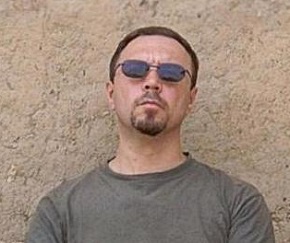
Viktor Pelevin (Moskou, 22 november 1962)
De Hongaarse dichter Endre Ady werd geboren op 22 november 1877 in het huidige Adyfalva. Zie ook alle tags voor Endre Ady op dit blog.
Hawk Mating On The Fallen Leaves
Up. Up. And onward into Autumn fly
In shrill pursuit and raucous hunting cry
A pair of hawks with summer-weary wings.
Summer has bred new pirates in her care
And fresher pinions flutter down her air
To join the lists of Love which now are wide.
We fled from Summer, now ourselves pursued,
Till somewhere sometime in an autumn wood
We stooped with fluttered wings for very love.
This is our final mating. Now the keen
Talon on feather tears the quick between
And so we fall together with the leaves
Mahnung an die Hüter
Ihr Hüter auf Wache, habt acht!
Die Sterne verstreut jede Nacht,
Erinnerung gestriger Sommer,
Glühwürmchen in Gärten entfacht.
Vermischt florentinischer Sommer
Mit Abschied vom Lido im Herbst,
Erinnerung dämmernder Morgen
An Ballsäle – dunstig – zerweht
An alles vergangene Schöne,
Das niemals durch Sterben vergeht.
Das ferne Lächeln der Herzen,
Lebendiges, Totes, behütet – bedacht,
Sieht auf euch besorgt und verlassen –
Ihr Hüter auf Wache, habt acht!
Ihr Hüter auf Wache, habt acht!
Das Leben will leben und lebt.
Es schenkt nicht deshalb soviel Schönes,
Damit es in Flammen zergeht,
Durch dumme und gierige Greuel.
So traurig das Menschsein auch ist,
Die Losung der heldischen Bestien,
Die Sterne verstreuende Nacht,
Sie lassen auch heut nicht vergessen
Den Glauben, durch Schönheit entfacht.
Ihr, die ihr noch da seid, bewahrend –
Ihr Hüter auf Wache, habt acht!
Vertaald door Paul Kárpáti e.a.
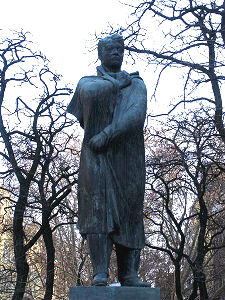
Endre Ady (22 november 1877 – 27 januari 1919)
Standbeeld in Boedapest
De Amerikaanse schrijver William Kotzwinkle werd geboren op 22 november 1943 in Scranton, Pennsylvania. Zie ook alle tags voor William Kotzwinkle op dit blog.
Uit: Fata Morgana
“Paris, 1861
The faces in the crowd were dark, from Spain, Morocco, Constantinople, and a sensuous air prevailed, exotic and violent. The shops were filled with cheap merchandise; a dark-haired prostitute stood on the corner, smiling, and Inspector Picard passed her, making his way through Pigalle. Glancing at his watch, he quickened his step, muttering the usual nonsense to himself about eating less and training more, for he was breathing heavily from his exertion. Yet he moved more swiftly than any other on the busy street, with the surprising swiftness of the bear who has suddenly found reason to move. And like the bear he had a heavy, natural grace, despite his fifty-two years and the extra pounds around his waistline, produced by a particularly delicious lemon tart sold on the rue Dauphine; he longed for one now, for as always when on the scent, a strange hunger stole over him—he felt he could devour Baron Mantes alive, swallow him down and munch his bones. As he hurried along, Picard studied certain faces carefully, taking note of their eyes, and also of their hands—the way they handled a franc note, almost caressing it, ritually folding it and slipping it away—these were men he would see again, in the intimate embrace of arrest, or they would find their fate elsewhere, or they would escape absolutely. The city was vast, sprawling, who could know it all? He left the street of cheap pimps and prostitutes, entering the chausee d’Antin, where the Great Whores had their apartments. The carriages at the curb belonged to diplomats, ambassadors, and the voices he heard were discreet, refined. Nonetheless, last month he’d assisted in the removal of a body from one of the luxurious gardens, where a duel had been fought over a whore’s favor. Madness prevailed everywhere. Ahead he saw the lights of the Opera. The street was lined with waiting carriages. Among them he spotted Paradis the ragman, a wicker basket over his shoulder, a filthy paper flower in his lapel. Picard approached the informer quickly. “He’s still here?” “The box seats,” said Paradis, staring wildly around him. Picard handed him a roll of franc notes. “Stay and point him out to me.” Paradis hurriedly thrust the money in his pocket and shuffled off as fast as he could, his enormous shoes slapping in the mud, his baggy pants trailing over his heels. Picard watched the retreating ragman for a moment, then turned and walked into the lobby of the theatre as the final ovation was being offered the horned and embattled singers. He took his position where he could observe those music lovers who’d held box seats. The crowd filed past, involved in the usual flirtations, the regular boredom. All they’d killed was another evening.”
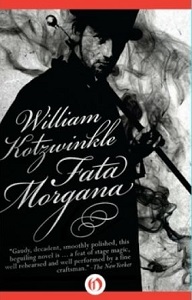
William Kotzwinkle (Scranton, 22 november 1943)
Cover
De Nederlands dichteres en schrijfster Elisabeth Maria Post werd geboren in Utrecht op 22 november 1755. Zie ook alle tags voor Elisabeth Maria Post op dit blog.
Uit: Het land, in brieven
“Ik woon, ’t is waar, bij een klein, afgelegen, en schaarsbezogt Dorpje. Op het hangen van eenen eenzamen heuvel, ligt mijn aangenaam Zorgenvrij. – Mijne eenvoudige woning, is verscholen onder rijzend geboomte. In het vreedzaam dal, dat aan deszelfs voet ligt, vertoonen zig de lage bemoste hutten der Landlieden, met eene bekorende nederigheid. Akkers, Weiden, Bergen, Dalen, Beken, Bronnen, Bosschen en Vlaktens versieren dezen voor mij betoverenden oord en maken dien des Zomers, tot een Eden. – Maar de Winter, vraagt gij? In den Winter, ja, is de Natuur van haar voornaamste sieraad berooft. Zij slaapt. Zij schijnt dood, en draagt alom de merktekenen van eene akelige verwoesting. De digtste bosschen staan nu bladerloos. De gevleugelde zangers zwijgen. De bloemhoven toonen niet meer, dan de dorre overblijfzelen van verdwenen schoonheid. De velden zijn ledig en de weiden zonder vee. Het geruisch der beekjes is niet meer betoverend. Met een woord: er is geen schaduw meer van die heerlijkheid, die alles voor weinig maanden versierde. – Maar zou de Natuur daarom thans alles schoon missen? De gure, de woeste winter, is wel een treurig, maar toch een grootsch toneel van Gods alvermogen: en dit denkbeeld; ‘De Natuur is niet dood – maar rust; zij bereidt zig, om eerlang met grooter luister te schitteren,’ – neemt veel van zijne treurigheid weg. Het vervuld den geest met streelende vooruitzigten, die dikwils meer voldoen dan het genot zelve. – Met welk eene vergenoegde hoop, zie ik aan de boomen de knopjes, waarin de bladeren zitten opgewonden, die mij in een volgend jaar zullen beschaduwen, of het sieraad en den groei der vrugten bevorderen! Ga ik naar eenen kersenboom, ik pluk een knopje, en open het: welk een aangename verwondering volgt op de spijt, waar mede ik een zo konstig natuur-gewrogt vernietig! Welk eene wijsheid, welk eene almagt toont het eenvoudig blaadje! Wat zeg ik eenvoudig? in de bijna onzigtbare deeltjes van deze digt in elkander gerolde blaadjes die reeds de toekomstige vrugt in zig besluiten, is een samenloop van wonderen.
Kunt gij in de stad, daar u zoo veele afleidingen uwen tijd ontrooven, wel om deze dingen denken, die kleinigheden schijnen in het oog van iemand, die er het zagt genoegen niet van kent?”
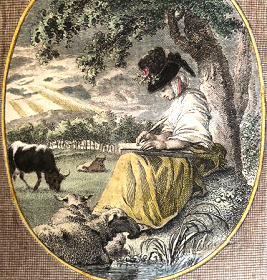
Elisabeth Maria Post (22 november 1755 – 3 juli 1812)
Illustratie uit “Het land, in brieven”
Zie voor nog meer schrijvers van de 22e november ook mijn blog van 22 november 2015 deel 2.

